About 10,000 people quietly congregated in Beijing on a spring day in 1999, now remembered as the April 25 appeal—the largest protest in China’s recent history.
A senior official drove by. Then the anti-riot police turned up. They rained down punches and kicks, and threw dozens of people into vans. One gray-haired woman fainted as the police dragged her away, her back scraping the ground.
City officials told the rest of the dazed crowd in Tianjin, a megacity in eastern China, they would need to go to Beijing to appeal if they wanted the prisoners released.
So they did—although the Tiananmen massacre a decade earlier still scarred them.
Ultimately, 10,000 people congregated quietly in Beijing on a day in 1999, now remembered as the April 25 appeal—the largest protest in communist China’s recent history.
Despite 25 years going by, those who were there that day say their issue is as relevant now as it was then.
Wang Huijuan, then a 28-year-old local elementary school teacher in Tianjin, clutched her husband’s arm tight as she watched the police make arrests in front of her. But it didn’t take long for her to make up her mind. That April 25 morning, she cried as she hugged her 5-year-old daughter goodbye before hopping into a cab to Beijing, 80 miles away.
“I thought at the time that no matter what would happen to me, I had to step forward, to tell my thoughts to the [authorities],” Ms. Wang, now in New York, told The Epoch Times. “If I don’t come back, so be it.”
In 1999, Falun Gong, the meditation she practiced, was popular in China. Around 70 million to 100 million Chinese people embraced the idea of living their lives based on the principles of truthfulness, compassion, and tolerance. Ms. Wang credits the practice for restoring her health and filling her life with “sunshine and hope.”
But the environment was changing.
Plainclothes police officers monitored Ms. Wang and others in a public park when they gathered to do the Falun Gong exercises. A state-run magazine published an article slandering the practice. When a group of practitioners asked for a retraction, Tianjin’s public security bureau dispatched riot police to beat them up and arrested 45.
As word of the police brutality began to spread, Falun Gong adherents around the country decided to travel to Zhongnanhai, the compound for the top Chinese Communist Party (CCP) leadership to ask for the release of the Tianjin detainees and for the freedom to practice their beliefs.
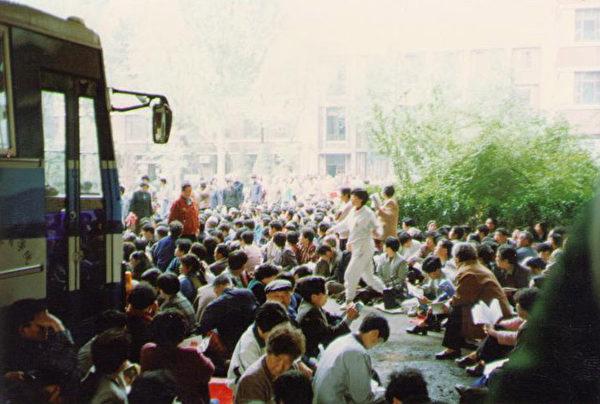 Falun Gong practitioners gather at a university to demand retraction of a state-run magazine article defaming their practice, in Tianjin, China in April 1999. (File photo)
Falun Gong practitioners gather at a university to demand retraction of a state-run magazine article defaming their practice, in Tianjin, China in April 1999. (File photo)‘Beijing Welcomes You’
Around daybreak, Ouyang Yan, then a 48-year-old administrative worker at the Communication University of China in Beijing, began biking toward Zhongnanhai. She was among the first to arrive. Few people were on the streets, but police cars were parked all around.
“We were thinking, did we come too early?” Ms. Ouyang, who now lives in Seattle, told The Epoch Times. “How come there wasn’t anyone?”
 Falun Gong practitioners gather on the streets near Zhongnanhai, the Chinese leadership compound in a peaceful protest, in Beijing, China, on April 25, 1999. (Illustration by The Epoch Times, Minghui.org)
Falun Gong practitioners gather on the streets near Zhongnanhai, the Chinese leadership compound in a peaceful protest, in Beijing, China, on April 25, 1999. (Illustration by The Epoch Times, Minghui.org)Within about half an hour though, more Falun Gong practitioners joined. Some arrived in the afternoon because they had flown in. There were people in their 80’s and a two-week-old newborn brought by their mother.
“I never saw so many people together, even on TV,” said Ms. Wang.
For an unorganized gathering, the practitioners were surprisingly orderly.
They lined up along the pedestrian paths, some walked around to pick up litter. It was peaceful enough that the police, once tense, gradually relaxed, sitting on street curbs and chatting among each other, according to Ms. Wang. Ms. Ouyang’s daughter stood studying for an upcoming exam.
At one point, Ms. Ouyang heard that some CCP officials from Zhongnanhai were asking to meet with representatives of the protest. She said she nearly volunteered herself, even though she wasn’t a great speaker.
“That day, I was so confident in myself that I would be able to explain to anyone how great the Falun Gong practice is.”
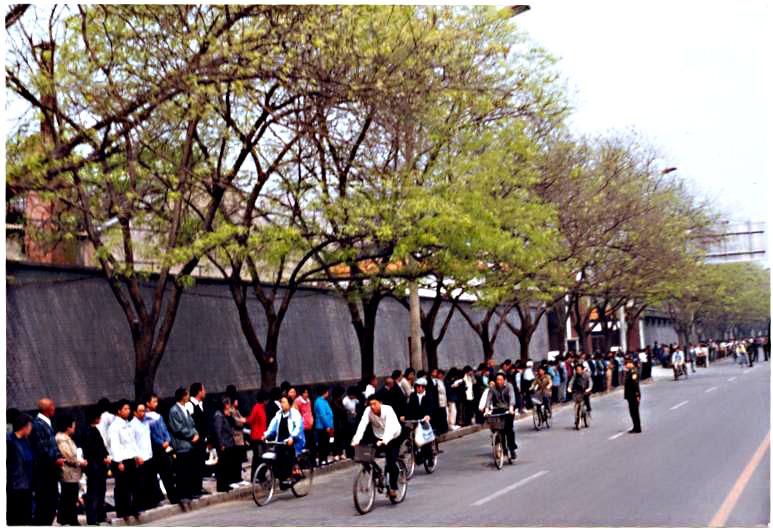 Falun Gong practitioners gather around Zhongnanhai, the Chinese Communist Party headquarters, in Beijing, China, on April 25, 1999. (Courtesy of Minghui.org)
Falun Gong practitioners gather around Zhongnanhai, the Chinese Communist Party headquarters, in Beijing, China, on April 25, 1999. (Courtesy of Minghui.org)In the late afternoon, bikers in sleeveless shirts waved to them.
“Beijing welcomes you, hope you come again,” Ms. Wang recalled them saying.
According to the Falun Dafa Information Center, two members of the Falun Dafa Research Society and three other Beijing-based practitioners went to the State Council to talk to CCP officials. They presented three requests, including the release of the Tianjin prisoners. At dusk, Tianjin authorities complied with the request.
Ms. Ouyang said most of the adherents left the protest by 9 p.m. But she and her husband stayed for another hour. They waited for her mother and joined her to pick up trash in the area.
Zhao Ruoxi, now a Chinese-language teacher in New York, was a host of a state-run radio station in Tianjin in 1999. That evening, when she learned about the release of detainees, she went to the local police station to pick them up. Tianjin’s police officials treated them all to an elaborate meal.
Ms. Zhao said the officials told her the arrests were all a “misunderstanding.”
“We didn’t know the situation, if we did, we wouldn’t have arrested you guys,” she recalled to The Epoch Times.
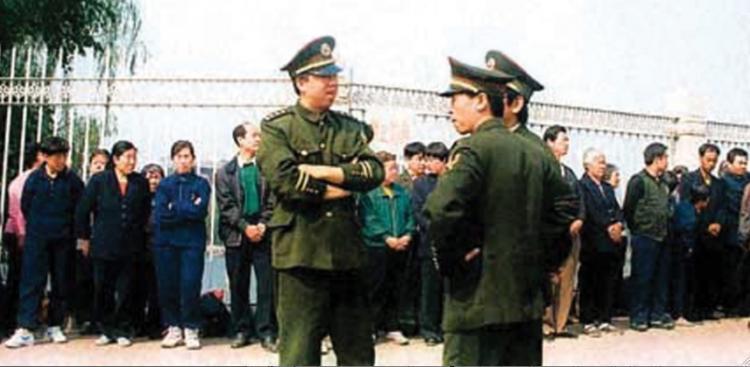 Police offiers stand in front of Falun Gong practitioners near Zhongnanhai, the Chinese Communist Party headquarters, in Beijing on April 25, 1999. (Courtesy of Minghui.org)
Police offiers stand in front of Falun Gong practitioners near Zhongnanhai, the Chinese Communist Party headquarters, in Beijing on April 25, 1999. (Courtesy of Minghui.org)‘Intention to Frame’
It could have ended there. But just three months later, communist leader Jiang Zemin ordered a nationwide campaign to eradicate the group.
The day Jiang’s order came out, on July 20, 1999, police knocked on the doors of Ms. Wang and Ms. Zhao’s homes.
Ms. Wang’s husband, a state TV anchor, and the radio host were taken away for interrogation. Ms. Wang’s school detained her the next day.
China’s state-run media distorted facts about the peaceful protest and repeatedly published propaganda about the event, often describing it as a “siege” against the CCP leadership. But some practitioners, now looking back, believe that the Chinese regime had planned it all along.
“When there’s an intention to frame someone, there’s no lack of excuses,” Ms. Wang told The Epoch Times.
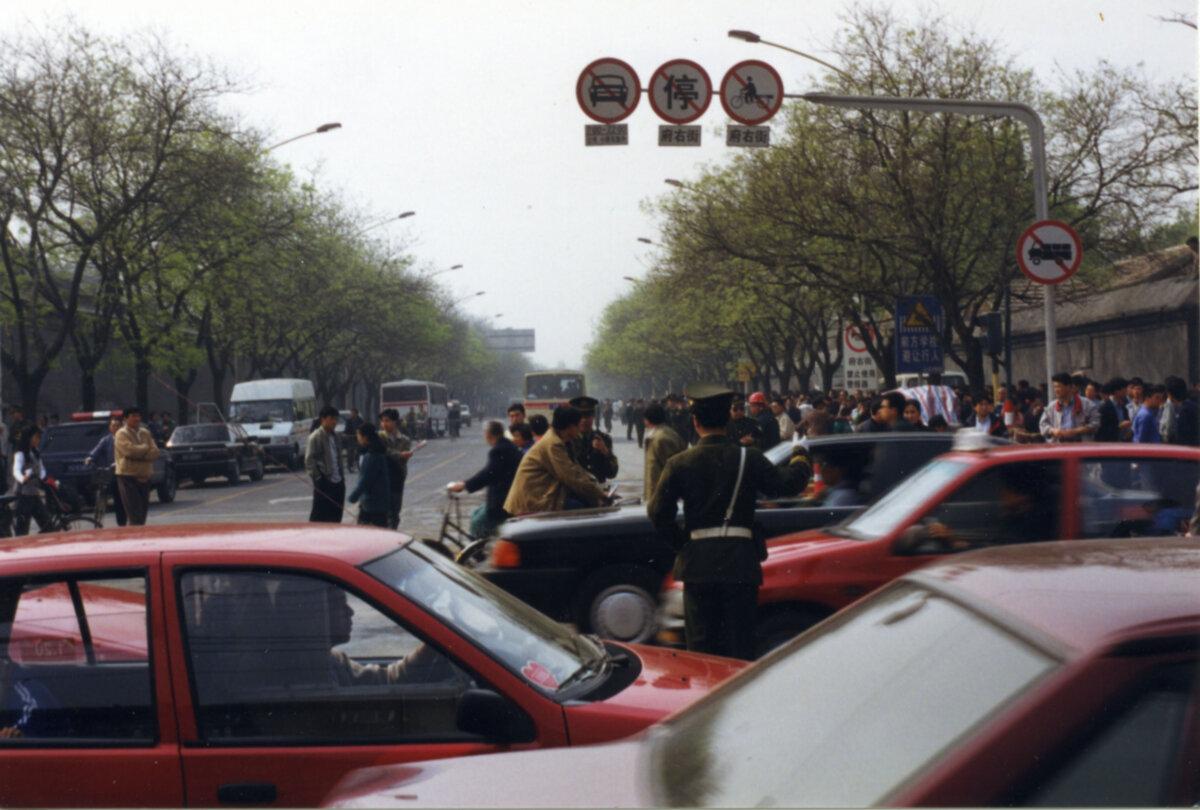 Police block the north side of Fuyou Street near Zhongnanhai, the central headquarters for the Chinese Communist Party, in Beijing on April 25, 1999. (Courtesy of Minghui.org)
Police block the north side of Fuyou Street near Zhongnanhai, the central headquarters for the Chinese Communist Party, in Beijing on April 25, 1999. (Courtesy of Minghui.org)At the April 25 appeal, she said many practitioners like her didn’t know where they should go at first, and they were guided by police officers to certain spots. Eventually, practitioners gathered on the sidewalk of two streets next to Zhongnanhai, making it appear as if they had intentionally “encircled” the CCP leadership compound.
She later heard that several Beijing hospitals near Zhongnanhai had been emptied that day, in preparation of treating traumatic injuries.
Ms. Wang said that initially there was a “sense of terror” in the air.
“The police car was driving by one after another, you know?” she said. “It’s the serenity that dissolved violence.”
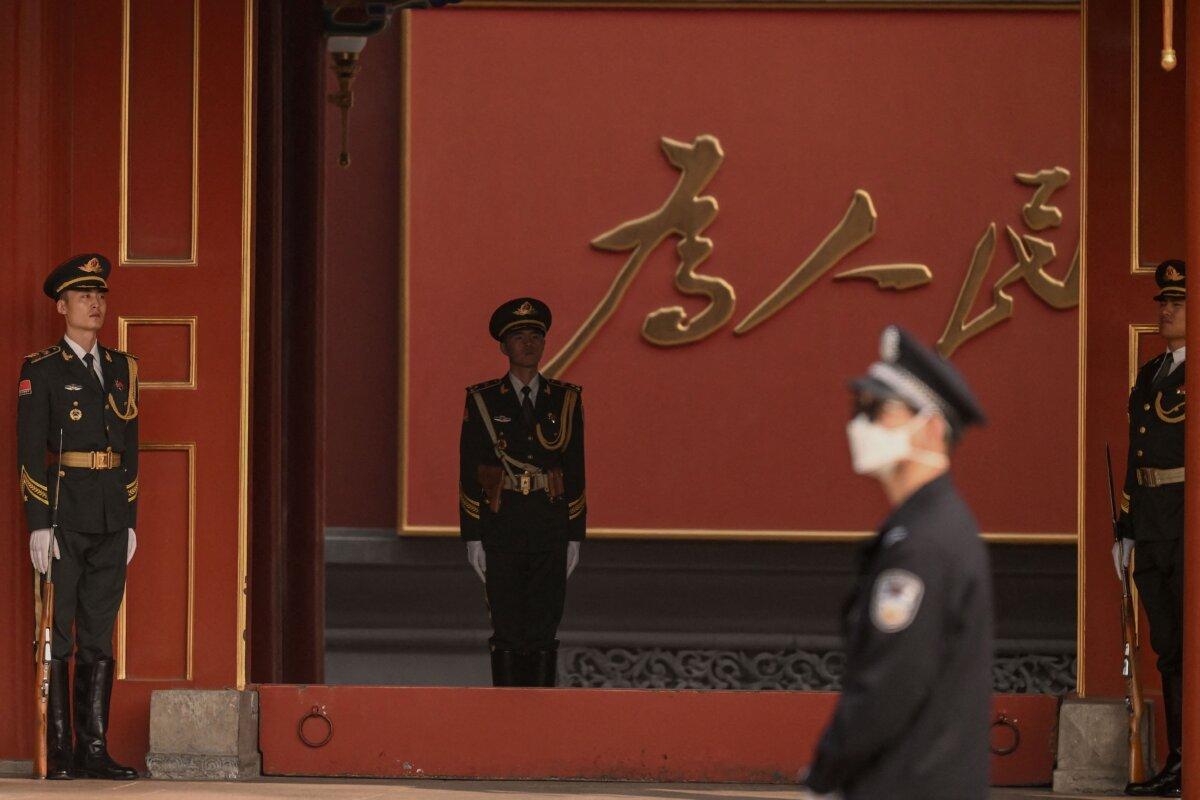 Security personnel stand guard at Zhongnanhai near Tiananmen Square ahead of China's 20th Communist Party Congress in Beijing on Oct. 13, 2022. (Noel Celis/AFP via Getty Images)
Security personnel stand guard at Zhongnanhai near Tiananmen Square ahead of China's 20th Communist Party Congress in Beijing on Oct. 13, 2022. (Noel Celis/AFP via Getty Images)Ms. Ouyang said that when she first arrived and was walking around, she was stopped by police from crossing a bridge that leads to Beihe Park, which is located several blocks from Zhongnanhai. The police officer’s directive meant that Chinese authorities had made certain arrangements, even before the start of the peaceful protest, she said.
She said a few blocks south from where they gathered were a large number of police vans.
“They could arrest people that very evening if [authorities] decided so.”
‘Best Gift’
In 2002, Ms. Wang and her husband were both fired from their jobs and arrested for making digital video discs disproving the propaganda about the persecution. They were imprisoned in separate places for seven years because they refused to sign the papers saying they had “transformed,” meaning given up their belief.
Her daughter was allowed to visit them twice a year.
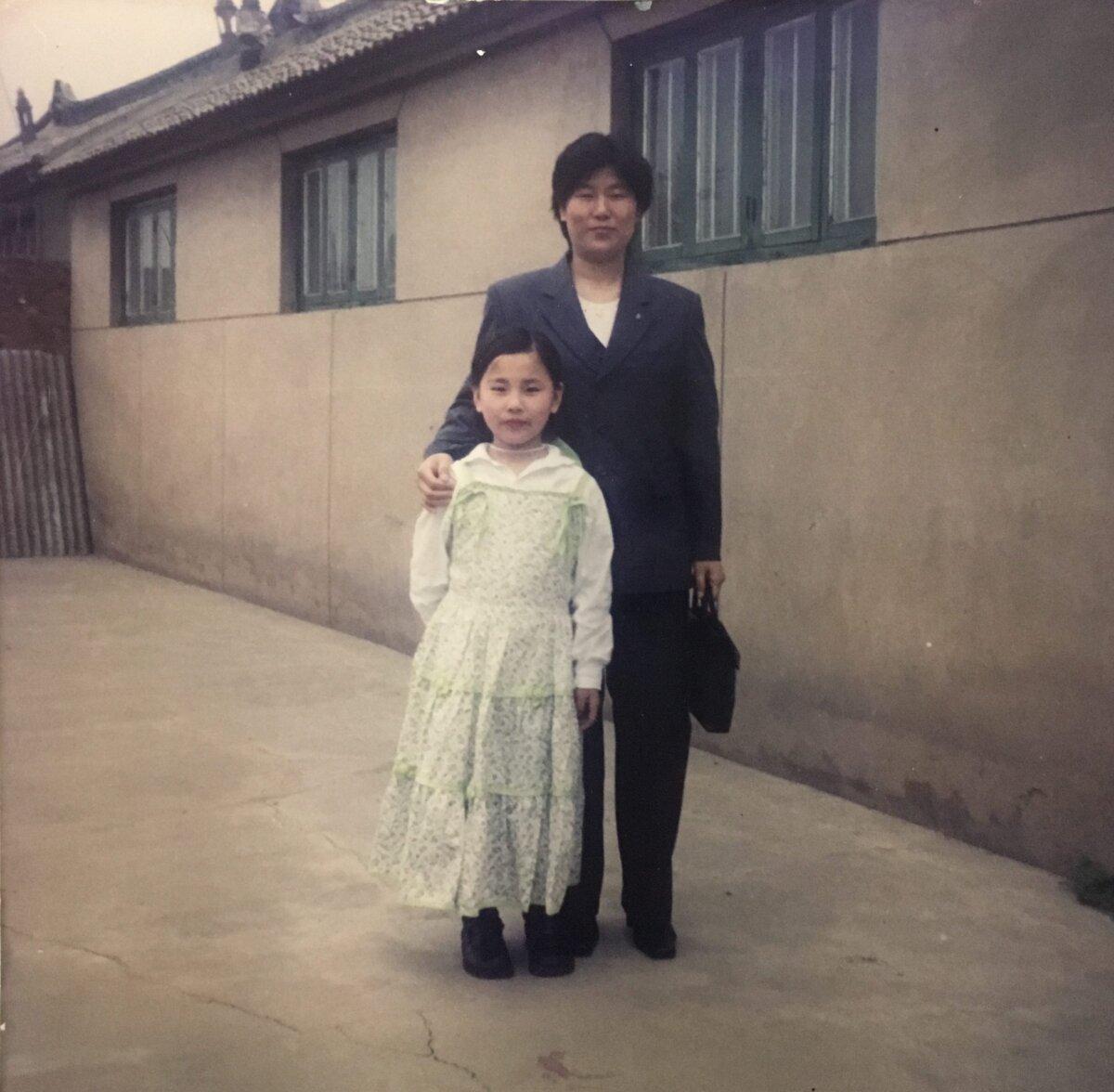 Wang Huijuan and her daughter in Tianjin, China, in 1999. (Courtesy of Wang Huijuan)
Wang Huijuan and her daughter in Tianjin, China, in 1999. (Courtesy of Wang Huijuan)“When she saw me at eight years old, I asked her: ‘Do you hate mom?‘ She said she doesn’t. I asked her, ‘Do you want mom to ‘transform’ and get home to take care of you, or do you want me to keep up?’ She told me, ’Mom, keep up.”’
Ms. Wang hugged her and cried.
According to Falun Dafa Information Center, millions of Falun Gong practitioners have been detained inside prisons, labor camps, and other facilities, with hundreds of thousands tortured while incarcerated. Many have been persecuted to death, and some were victims of China’s state-sanctioned practice of forced organ harvesting.
“Except for mainland China, everywhere you can practice Falun Gong freely, to promote it in public,” said Ms. Zhao.
“Only the CCP arrests people who practice truthfulness, compassion, and tolerance.”
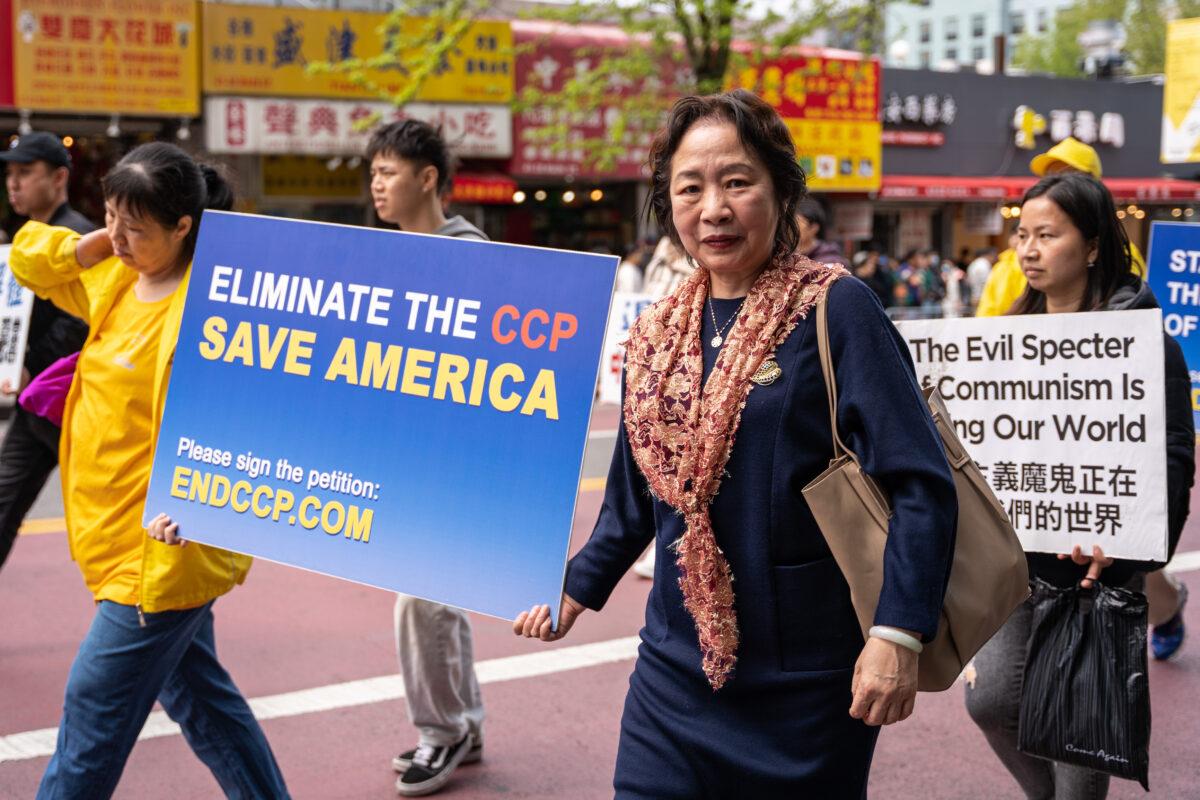 Falun Gong practitioner Zhao Ruoxi participates in a parade to call for an end to the Chinese Communist Party's persecution of her faith in the Flushing neighborhood of Queens, N.Y., on April 23, 2023. (Chung I Ho/The Epoch Times)
Falun Gong practitioner Zhao Ruoxi participates in a parade to call for an end to the Chinese Communist Party's persecution of her faith in the Flushing neighborhood of Queens, N.Y., on April 23, 2023. (Chung I Ho/The Epoch Times)The April 25 appeal has always inspired Ms. Wang.
“It was an honor to be standing there,” she said.
“Sometimes you might think you are all alone, but when you think about these people on April 25, so many of them all standing there, you realize that you are not actually alone. In every corner of the country, there’s someone like you, suffering pain and sacrificing themselves in silence. They are sacrificing their all for the truth.”
It was an experience to overcome fear and speak a truthful word, she said.
“It was a sacred feeling.”
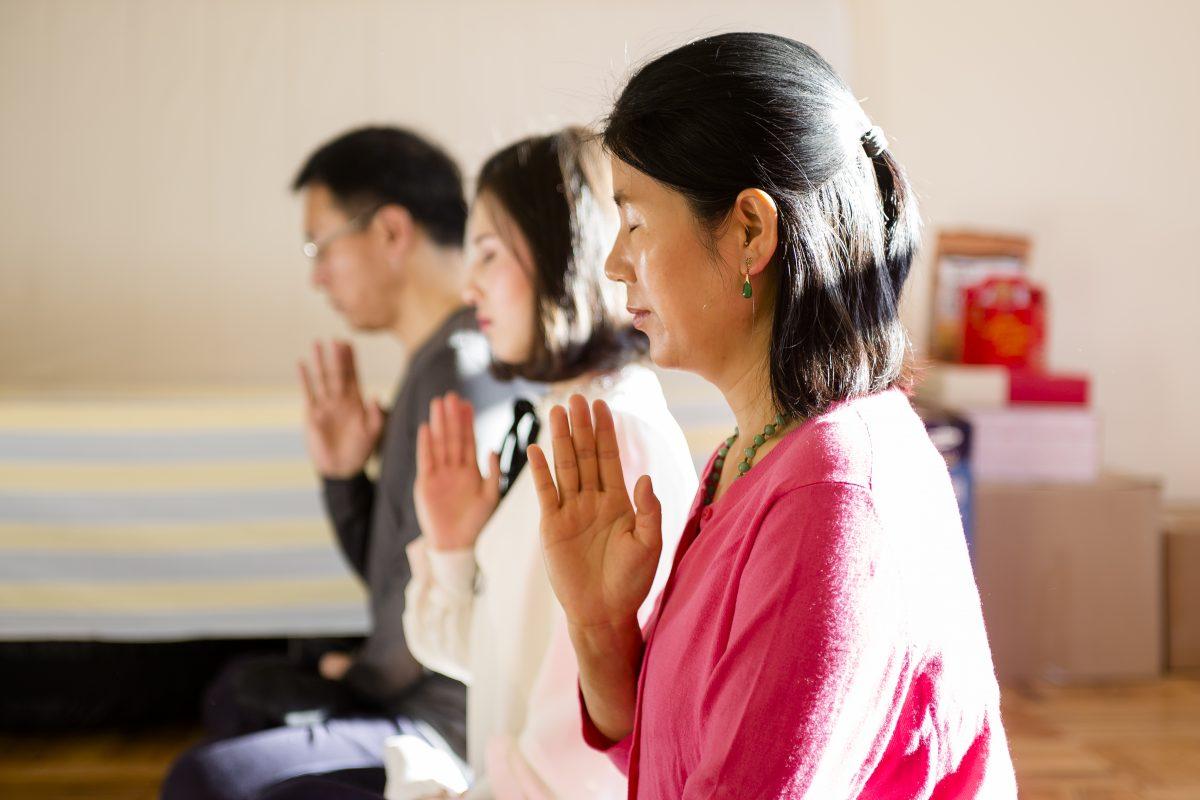 Wang Huijuan, along with her daughter and husband demonstrate their meditation practice at their home in Queens, New York, on Jan. 8, 2016. (Samira Bouaou/Epoch Times)
Wang Huijuan, along with her daughter and husband demonstrate their meditation practice at their home in Queens, New York, on Jan. 8, 2016. (Samira Bouaou/Epoch Times)Ms. Wang said she ran a wedding dress store after the prison term. Once she chatted with a young man around 30. He said he listened to an overseas television channel about how peaceful the April 25 appeal was. He wanted to know more about Falun Gong.
“Who dared to go to Tiananmen to petition after June 4,” he said, referring to the 1989 massacre. Ms. Wang gave him “Zhuan Falun,” Falun Gong’s main book. A few months later, the man invited Ms. Wang and her husband to his home.
During the meal, he raised his glass. “Thank you for letting us know about truthfulness, compassion, tolerance. This is the best gift to us,” he said.
“This is the impact of April 25,” Ms. Wang said.
‘A Beacon of Hope’
The day of the appeal, Elizabeth Huang, who was 1,000 miles south, in the city of Guangzhou, received a phone call from a fellow practitioner at around 6 p.m. local time and learned about the protest. Immediately, she felt the urge to join and considered booking an early flight the next day to Beijing.
Her trip never materialized. At around 10:30 p.m., Ms. Huang contacted a practitioner who had been at the protest. Talking on the phone, she learned that the gathering had just ended. Initially, she said she was “very shocked” to learn that Chinese authorities had agreed to release the detained practitioners, thinking that people in China usually had to go through all kinds of trouble to get someone released.
“That night, I had a very good sleep,” Ms. Huang told The Epoch Times. “I believed at the time that the dust had settled, and I wouldn’t have to worry” about practitioners being mistreated by authorities in the future.
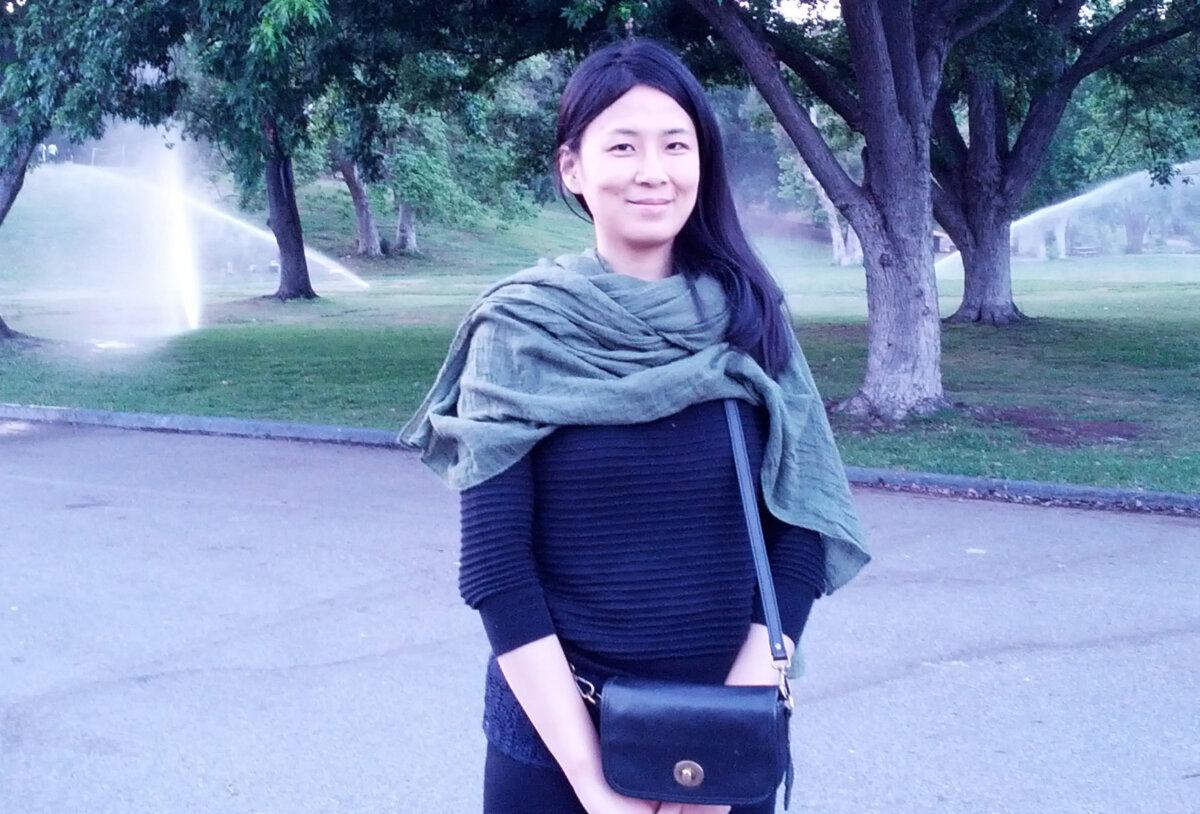 Elizabeth Huang in San Francisco on Sept. 13, 2014. (Courtesy of Elizabeth Huang)
Elizabeth Huang in San Francisco on Sept. 13, 2014. (Courtesy of Elizabeth Huang)Ms. Huang, now 53, lives in the Bay Area and has been in the United States since 2013. She left China in 2009 because of the persecution.
Before leaving China, she worked for a state-run media and once assisted in covering a local event about Falun Gong before the start of the CCP’s persecution.
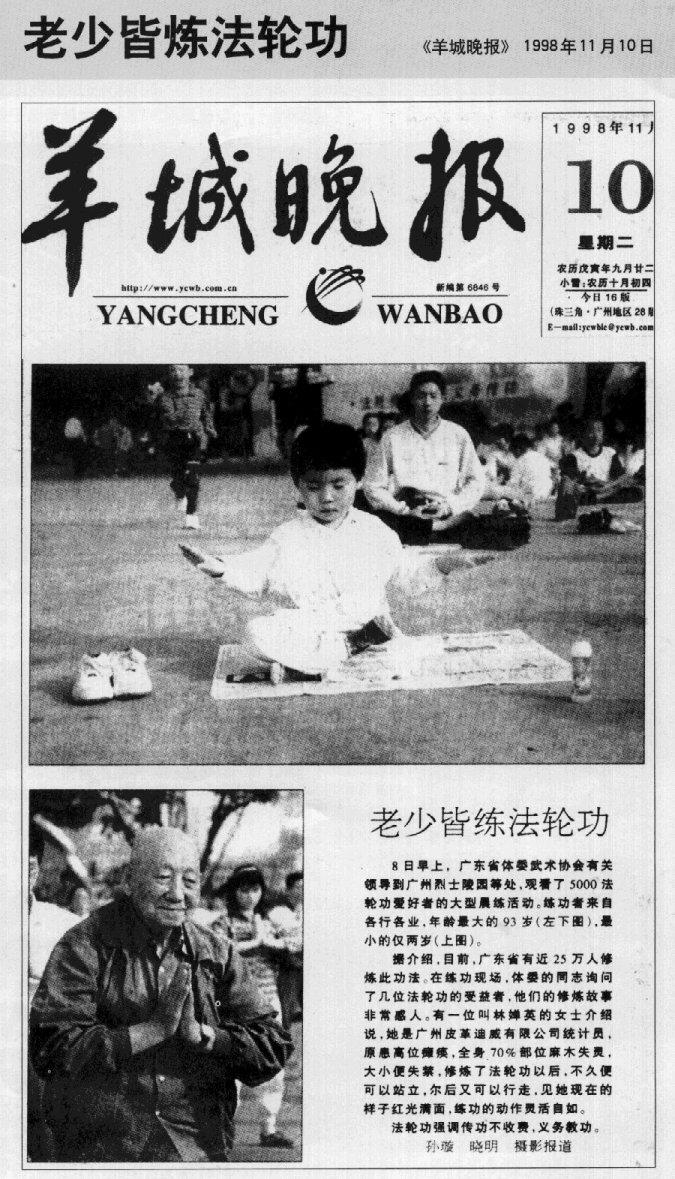 A Yangcheng Evening News report from Nov. 10, 1998, saying 5,000 Falun Gong practitioners were practicing Falun Gong exercises in a park, in Guangzhou, China. (Courtesy of Minghui.org)
A Yangcheng Evening News report from Nov. 10, 1998, saying 5,000 Falun Gong practitioners were practicing Falun Gong exercises in a park, in Guangzhou, China. (Courtesy of Minghui.org)She started working at the Guangzhou-based newspaper Yangcheng Evening News on Dec. 21, 1994. In December of that year, while still an intern, she used her press pass to attend Mr. Li’s lecture at a local sports auditorium. She began practicing Falun Gong three years later.
On Nov. 8, 1998, Ms. Huang had become a layout editor at the newspaper. She joined a local exercise location in the morning with her co-workers and saw nearly 5,000 Falun Gong doing the exercises together. Two days later, the newspaper published an article titled “People of All Ages Practice Falun Gong.”
In the months since the article’s publication, Ms. Huang said her workplace slowly changed. She recalled that her co-workers and superiors, likely having been exposed to other state-run media’s negative reporting about Falun Gong, began reminding her that it might not be a good idea to take up the practice.
Ms. Huang said her colleagues involved in publishing the 1998 article were subjected to a “self-criticism” process and forced to say it was a mistake to cover the Falun Gong group exercise.
Ms. Huang still regrets not being able to join the appeal on April 25, 1999.
She wished she had been there so she could be “one of the lights” making up a “beacon of hope and goodness.”

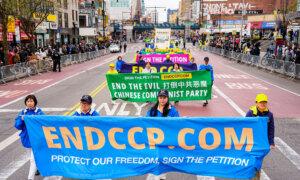












 English (US) ·
English (US) ·  Turkish (TR) ·
Turkish (TR) ·